 Petzlover
PetzloverGrand Basset Griffon Vendeen is originated from France but Turnspit Dog is originated from United Kingdom. Grand Basset Griffon Vendeen may grow 15 cm / 6 inches higher than Turnspit Dog. Grand Basset Griffon Vendeen may weigh 6 kg / 14 pounds more than Turnspit Dog. Both Grand Basset Griffon Vendeen and Turnspit Dog has almost same life span. Grand Basset Griffon Vendeen may have more litter size than Turnspit Dog. Grand Basset Griffon Vendeen requires Moderate Maintenance. But Turnspit Dog requires Low Maintenance
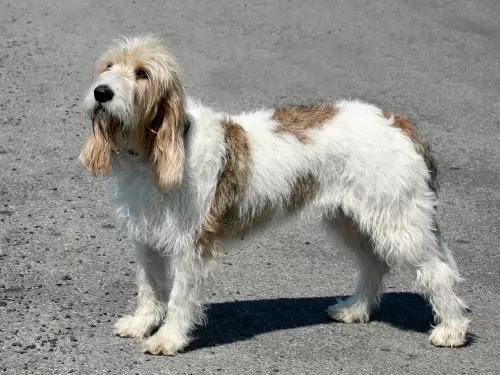 The Grand Basset Griffon Vendeen is a French scenthound that has changed over many centuries and today the area in France where they originate from, has contributed to the dog's looks.
The Grand Basset Griffon Vendeen is a French scenthound that has changed over many centuries and today the area in France where they originate from, has contributed to the dog's looks.
The rocky and thorny region of Vendeé required a hardy breed of dog. Also, hunters wanted a slower hound that they could keep up with, and the idea was to shorten the legs of the dog.
By the end of the 19th century, the Basset Griffon Vendéen was developed. By the 1950s, the Grand was considered a separate breed. and Petit was not banned until 1977.Today the dog is a long-backed and short-legged hunting dog.
It is amazing that this small dog’s popularity comes from him being used in the kitchens to roast meat. The British enjoyed eating their meat which they roasted on a fire.
These dogs were essentially regarded as a tool – a means to an end, and when kitchens were modernized, they were no longer needed, and they became extinct.
Referred to as the kitchen dog or cooking dog, the first mention of these little dogs was made in 1576. By 1850 the dogs had become scarce and by 1900 it seemed as though there were none left.
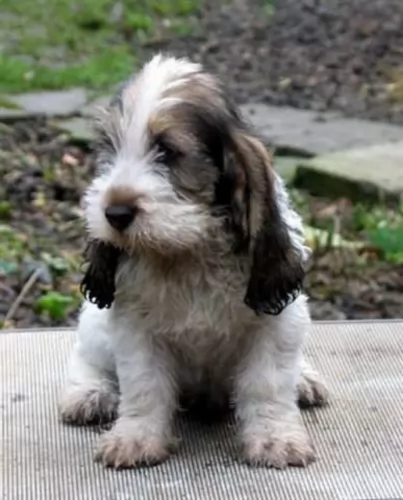 Kept today essentially as a domestic pet, the Grand Basset Griffon Vendéen is a strongly built dog, a rough-coated scent hound of medium size standing at roughly 39 to 45cm in height and weighing 18 to 20kg.
Kept today essentially as a domestic pet, the Grand Basset Griffon Vendéen is a strongly built dog, a rough-coated scent hound of medium size standing at roughly 39 to 45cm in height and weighing 18 to 20kg.
The coat is medium length, shaggy and wiry. It is essentially white with orange markings. Sometimes he can be tri-colored, having a combination orange, black or tan markings. The Grand Basset Griffon Vendeen’s coat is double with a thick, weather-resistant undercoat and a rough, harsh topcoat. In addition to regular brushing, this breed’s coat needs to be hand-stripped once a year.
His legs are straight, and he is longer than he is tall. He is a deep chested dog with long ears and a long tail. He is also noted for his mustache and beard with long eyebrows.
Your Grand Basset is a courageous, happy, confident dog, active and having great stamina.
He is a social, pack dog so he will be wanting plenty of time spent with his owner, failing which the owner should invest in another dog too. He will get on great with children and he is also a pet-friendly breed who will get on well with cats too. He is sharp and alert and responds well to training and socialization.
The Turnspit was a small long-bodied dog, standing at between 20 to 30cm in height and probably weighed anything between 9 and 14kg in height.
The legs were somewhat crooked or bandy and Edward Jesse, who wrote ‘Anecdote of Dogs’ in 1846 described them as ugly dogs with a miserable look to them. That was probably due to him having to fit into the hamster-like wheel contraption that turned the meat being roasted in the kitchens.
They were low-bodied dogs, similar to a Dachshund or a Corgi with short, stocky legs, short floppy ears, and a short coat. The long tail curled over its back. It is believed that the coats were white, reddish-brown, gray or black.
The dog was certainly feisty, energetic and hard-working with not much being written about his temperament. He was a working dog, but given the chance, he would no doubt have been loving and loyal, longing for the chance just to be part of a human family and to be loved.
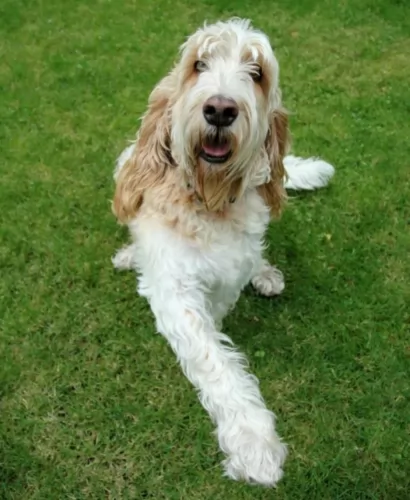 This long-backed, short legged hunting dog has a happy, confident personality.
This long-backed, short legged hunting dog has a happy, confident personality.
While he was used originally for hunting, he is now commonly kept as a companion dog. He is energetic and independent and will require you having him join you for walks and a ball game too.
Non-aggressive and adaptable he can live in the city or in the countryside so long as he receives plenty of attention and love – then he'll be a splendid pet.
The Turnspit dog had a tough life, but would no doubt have made a wonderful little pet had he just been allowed to be a companion dog.
Make sure that when you buy a dog, you don't just put him in your backyard and forget about him. Give him the love and care he deserves.
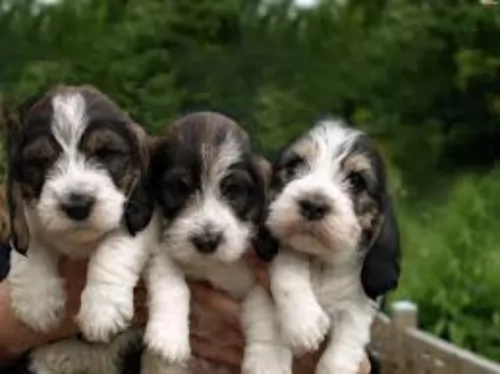 There are some Basset Griffon Vendéens that have reached 17 years of age. This is excellent for these dogs and lifestyle, nutrition and exercise can all play a part in the longevity of any dog.
There are some Basset Griffon Vendéens that have reached 17 years of age. This is excellent for these dogs and lifestyle, nutrition and exercise can all play a part in the longevity of any dog.
Generally they live to be 10 to 14 years of age. While he is a pretty robust dog, you'll want to be aware of some of the diseases which may require veterinary intervention -
Cancer is a major cause of death in elderly dogs, but if caught early, the dog can be cured. These cancers can be malignant lymphoma, skin cancer, bone cancer or soft tissue sarcomas. You'll notice a lump on your pet or a wound they won't heal. When you notice your dog not feeling well, get him to the vet.
A common form of heart disease in dogs is valvular disease, heartworm disease and myocardial disease. The signs of heart disease in your pet will depend on the severity of the disease and type. As heart disease moves on to congestive heart failure, you'll notice symptoms such as difficulty with breathing, fatigue, loss of appetite and weight loss. You need to get your dog immediately to the vet.
Dog allergies can be caused by pollen, medications, food or insects. You'll notice your pet scratching, he'll have watery eyes and inflamed skin. This inflammatory condition can cause a lot of agony for your pet, driving him mad with pain and the desire to scratch and lick. Relieve his discomfort by getting him to the vet as soon as possible.
The health and lifespan of a dog is influenced by quite a few things such as food, care, love, exercise and the type of breed it is. Generally smaller dogs live longer than big dogs, and mixed breed dogs live longer than pure breeds.
The Turnspit dog, if he had received the proper care, could have lived to between 10 and 15 years of age.
Stress can bring on a sudden drop in blood sugar. The Turnspit had reason to be stressed, working hard in horrible conditions. Dogs become weak and lethargic and can scarcely maintain an even gait. A sudden drop in blood sugar can cause a small dog to go into a fatal coma.
This ailment seems to occur more often with smaller dogs. The pancreas becomes inflamed and your dog has vomiting, diarrhea, abdominal pain and dehydration. Pancreatitis can come about because of trauma, metabolic disorders or infection.
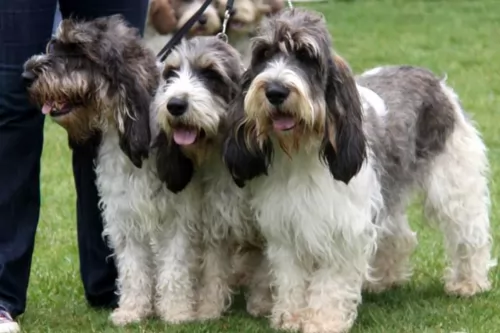 If you are going to be feeding your Grand Basset Griffon Vendéen kibble, there are excellent brands that bring out breed-specific formulas for age, size and energy levels of dogs.
If you are going to be feeding your Grand Basset Griffon Vendéen kibble, there are excellent brands that bring out breed-specific formulas for age, size and energy levels of dogs.
Feeding a dog is an individual choice, but good food can increase his longevity. A bit of raw meat mixed into his kibble, or some cooked brown rice, vegetables and chicken will be excellent for him. This can be a tasty variety to his diet.
Fresh, cool water must always be available at all times.
The Grand Basset Griffon Vendeen’s coat is double and the rough, harsh coat will need brushing twice a week and stripped once a year.
A dog is man's best friend, but the Turnspit was essentially just a working dog and most likely didn’t receive the proper care he deserved.
Small dogs like these would have had basic needs. Their owners would have had to pay attention to the dog's health, because he needed to work.
We look at ways in which a small dog like the Turnspit should have been cared for -
One wonders if the Turnspit was allowed to eat any of the roast meat he worked so hard on to get ready. Every dog should have a regular meal.
Most adult dogs should be fed 2 meals of kibble a day. If the Turnspit wasn’t extinct he would have required a high quality ‘small dog breed’ commercial dog food. Home-made food would also be a requirement – some boiled chicken, brown rice and vegetables. Dogs want and appreciate simple, wholesome foods that won’t upset their digestive systems.
Along with good food, dogs need cool, fresh water constantly available to stay healthy.
Make sure he gets to the veterinarian if he is sick, but also for his vaccines to prevent him from getting some of the worst dog diseases there are.
Groom your small dog regularly. The Turnspit had a shortish coat and would have required a brush twice a week. Other grooming procedures for a small dog like the Turnspit would have been keeping his nails trimmed and checking the inside of his ears and his mouth for ear infections and dental disease.